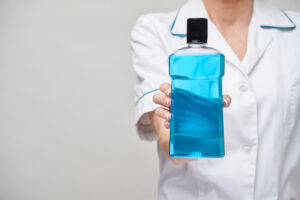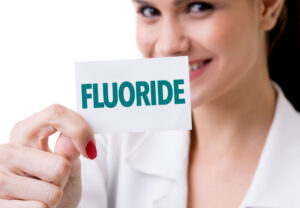What is the Best Mouthwash, According to Dentists?
 In every industry, people want to know what the experts use. When you apply that to dentistry, the answer is not a simple product recommendation, though. Because each person is unique with different oral health risks and histories, there is no good one-size-fits-all approach. That means there is no single “best mouthwash” out there.
In every industry, people want to know what the experts use. When you apply that to dentistry, the answer is not a simple product recommendation, though. Because each person is unique with different oral health risks and histories, there is no good one-size-fits-all approach. That means there is no single “best mouthwash” out there.
Let us explain.
What is the Purpose of Mouthwash?
Mouthwash is not as essential to having a healthy mouth as brushing and flossing are, and it can never take the place of brushing and flossing. Dental plaque, which contains the disease-causing bacteria of cavities and gum disease, must be physically removed with toothbrush bristles or floss. You cannot depend upon rinsing your mouth to remove dental plaque.
Mouthwash can, however, loosen dental plaque and make it easier to remove. Many mouthwash formulations contain ingredients that are antiseptic, which help reduce the overall amount of bacteria in the mouth.
Mouthwash is also a wonderful vehicle for bringing important minerals or other oral health supplements to the teeth and gums. By swishing a particular rinse for one to two minutes, you can provide your teeth with vital nutrients!
Which Types of Mouthwash or Ingredients Are Best for Specific Oral Health Issues?
In order to know which mouthwash is best for you, you have to know which oral health risks you have. You also need to understand which formulations or ingredients to look for and which to avoid. You can actually make a problem worse by using the wrong mouthwash.
High Risk for Cavities
 If you have a high risk for developing new cavities, mouthwash is a wonderful way to add enamel-strengthening nutrients back into your teeth. Cavities are the result of acid attacks by bacteria in dental plaque that have “eaten” sugar. They digest the simple carbohydrates and produce an acid that can soften and weaken tooth enamel, allowing the bacteria to penetrate into the tooth.
If you have a high risk for developing new cavities, mouthwash is a wonderful way to add enamel-strengthening nutrients back into your teeth. Cavities are the result of acid attacks by bacteria in dental plaque that have “eaten” sugar. They digest the simple carbohydrates and produce an acid that can soften and weaken tooth enamel, allowing the bacteria to penetrate into the tooth.
We fight this cavity process by adding minerals into the enamel surface through the promotion of remineralization. You can do this with your mouthwash by using a formula that contains fluoride. Fluoride fights cavities, and it is the most readily available ingredient, making it the easiest to find in your over-the-counter search.
If you want to avoid fluoride (which we do not recommend for those prone to cavities), you should look for an alternative remineralizing agent like nanohydroxyapatite, arginine or amorphous calcium phosphate. These ingredients are rarer at this time, so you might have trouble finding them at your local store.
High Risk for Gum Disease
Those who have a high risk for gum disease should look for ingredients that aim to fight the specific bacteria associated with periodontal issues. This does include the antiseptic properties that come with strong essential oils like thymol, menthol and eucalyptol.
You can also seek a prescription mouthwash from your dentist that contains the antibiotic Chlorhexidine. This antibiotic medication targets the bugs that cause gum disease, but it is not acceptable for continuous use. It should be used for temporary stints only.
Other over-the-counter formulations target gum disease with ingredients like Cetylpyridinium Chloride and Chlorine Dioxide.
Dry Mouth
Dry mouth is a very prevalent problem for adults in the US today. The most common cause of dry mouth is combinations of prescription drugs, as many drugs cause reduced salivary flow as a side effect. The potential for dry mouth worsens exponentially when a patient takes multiple prescription medications.
A dry mouth carries a much higher risk for both cavities and gum disease. Patients with dry mouth tend to have more frequent mouth sores or ulcers and bite their lips and tongues more often.
Someone with a dry mouth should never use a mouthwash that contains alcohol. Alcohol itself is a drying agent, and it will leave the mouth worse than it was prior to rinsing. The essential oils thymol, menthol, and eucalyptol are too strong for use in a dry mouth, and they will cause irritation of the soft tissues.
We recommend either Biotene’s line of dry mouth products or a rinse made by Colgate called Hydris. These formulations contain no harsh chemicals or alcohol, so they will not sting or burn the dry mouth. They also contain ingredients for added moisturization of the soft tissues inside the mouth.
Because of the increased risk for cavities that come with a dry mouth, we also recommend fluoride for our dry mouth patients.
Frequent Ulcers or Mouth Sores
If you suffer from frequent ulcers or mouth sores, you should also avoid the strong essential oils and alcohol-containing rinses that we advised against for our dry mouth patients. These chemicals can irritate the soft tissues so much that they actually cause more ulcers.
For those with a risk for developing ulcers, we actually recommend the same types of mouthwash that we do for those with dry mouth. The lubrication and mild formulas help prevent more ulcers. If you have active ulcers, you can consider Colgate’s Peroxyl, which is specially formulated to relieve the pain of mouth sores and promote healing.
Does Whitening Mouthwash Actually Work?
 Great question!
Great question!
The answer is no. Mouthwash is not capable of whitening the teeth. True teeth whitening requires a particular length of time with the active ingredient in contact with the teeth. Even if you could hold the mouthwash in your mouth for fifteen minutes, you would risk damaging the soft tissues in your mouth with it. You see, the active ingredient necessary for true teeth whitening is either hydrogen peroxide or its close relative carbamide peroxide. These chemicals are safe for the enamel on teeth, but they are irritants to the soft tissues of the mouth. Don’t try to hold peroxide-containing mouthrinses in your mouth for more than one to two minutes. It won’t whiten your teeth, and it will irritate your mouth’s lining tissues.
Can I Make a Homemade Mouthwash?
You can. There are certain ingredients to avoid. Make sure that you do not use any DIY recipes that include acidic fruit juices (and they are all acidic) or vinegars. See our previous blog about apple cider vinegar to understand why . . .
It is safe to use ingredients like coconut oil or baking soda. These are not acidic and non-abrasive to the teeth.
More Questions about Mouthwash?
Call Designer Smiles today to schedule a consultation with Dr. Ann or one of our wonderful hygienists. We can assess your unique oral health risks and make a customized mouthwash recommendation to meet your specific dental care needs.
